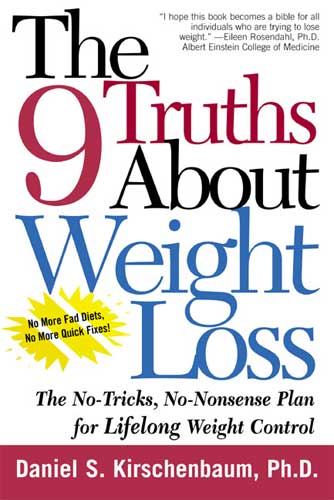 The 9 Truths About Weight Loss
The 9 Truths About Weight Loss
by Daniel S. Kirschenbaum, PhD
For anyone interested in weight loss, certain essential questions tend to come up again and again: Are there any shortcuts? What exactly do I need to eat? Do I have to exercise? If so, how much, how often, and in what way? Is it even possible for me to lose weight? What if I lose weight but then gain it right back? Does the process have to be painful? Will it make me happy? Why haven’t I been able to lose this weight and keep it off?
In The 9 Truths About Weight Loss, Professor of Psychiatry Daniel Kirschenbaum tackles-and in my opinion, largely answers-these questions and many others. Kirschenbaum is the director of the Center for Behavioral Medicine and has consulted for Weight Watchers and the U.S. Olympic Team, among other organizations, in addition to coaching literally thousands of clients successfully through the weight loss process. He really, really knows what he’s talking about, and unlike many diet “experts” generally doesn’t have a system to sell. His 9 Truths boil down to something like this: yes it’s hard, but it’s possible if you can find a way to commit to working hard at weight loss consistently and permanently.
In a little bit more detail, here are his 9 Truths, paraphrased:
1. Our bodies are designed to resist losing fat
2. However, the right behavior can overcome this biological tendency so that we can lose weight
3. Weight control is as feasible as any other athletic challenge
4. The three stages of weight control are Honeymoon, Frustration, and Acceptance
5. It’s possible to eat a very low-fat diet and still not feel overly hungry
6. Tracking your eating and exercise habits is key to weight loss
7. Exercising every day (or close to it) is a very effective route to weight loss
8. Eating reasonably can fit comfortably with managing stress
9. It’s easier to maintain weight loss you’ve already achieved than to lose weight in the first place
While I think Kirschenbaum’s book is excellent, I do feel it has some problems, most of them having to do with Kirschenbaum confusing some reasonable but not necessarily essential behaviors he has counseled his successful clients to take with required behaviors for weight loss. Many of Kirschenbaum’s conclusions about weight loss-for instance, that everything you eat “counts,” that the human body resists losing fat once it has acquired it, etc.-seem to be spot on. Others seem to be just his preferred way of advising people to lose weight.
As one example out of many, Kirschenbaum states “Almost all of the thousands of weight controllers with whom I have worked over the last twenty-five years, and who have succeeded at this difficult enterprise, have exercised primarily in the morning,” implying that this timing is important to successful weight loss. Speaking as someone who started losing weight four years ago, who has so far lost well over 50 pounds, and who has never gained back any significant amount of weight in those four years, I feel I should mention that I exercise almost exclusively at night, as do the lion’s share of other succcessful exercisers I know. I won’t debate the relative merits of morning vs. evening, and in fact it may be better to exercise in the morning if you can manage it, but the fact is that exercising very regularly seems to be much, much more important than exactly when you do it.
Kirschenbaum offers a variety of these recommendations that, based on my own experience and/or research I’ve come across, seem to be unnecessary, but the recommendations generally don’t seem to be problematic and are minor in scope. Reading the book with a little skepticism for very specific recommendations but profound respect for Kirschenbaum’s key points will improve almost anyone’s understanding of weight loss.
Kirschenbaum repeatedly talks about weight loss as an athletic goal, which is one of the most positive and useful ways of looking at it I’ve heard. Like a professional athlete, someone who wants to lose weight needs to become profoundly proactive about diet, exercise regime, and motivation. More than that, the goal isn’t to achieve some imagined ideal point and then stop doing anything, but rather to get to one’s highest level of performance and stay there.
Another area where Kirschenbaum shines is in providing solid information on motivating ourselves to lose weight, although he covers only certain facets of this very big subject. This leads into the only other major reservation I have about the book, which is that Kirschenbaum always talks about weight loss as a strenuous and often unpleasant thing to do. He’s certainly right that it takes a lot of effort and goes against the grain for most of our typical behavior, but the image he conveys of successful weight-controllers struggling grimly against an unforgiving biology fails to fully take into account the incredible array of ways we can motivate ourselves, change our thinking, and even take on new beliefs. My own weight loss efforts, which have become better-focused and more effective thanks to Kirschenbaum’s book, are definitely effortful-but they’re anything but unpleasant. For every ten or fifteen minutes of mild suffering at having to wait because it’s not time to eat yet, I get hours of pleasure at having a more energetic, leaner, and more capable body. Kirschenbaum does a great job of showing how and why weight loss is possible; any of us who work at weight loss will have to work on our own (or use resources like The Willpower Engine) to learn how and why weight loss can be enjoyable and fulfilling.
Like this:
Like Loading...



 The 9 Truths About Weight Loss
The 9 Truths About Weight Loss